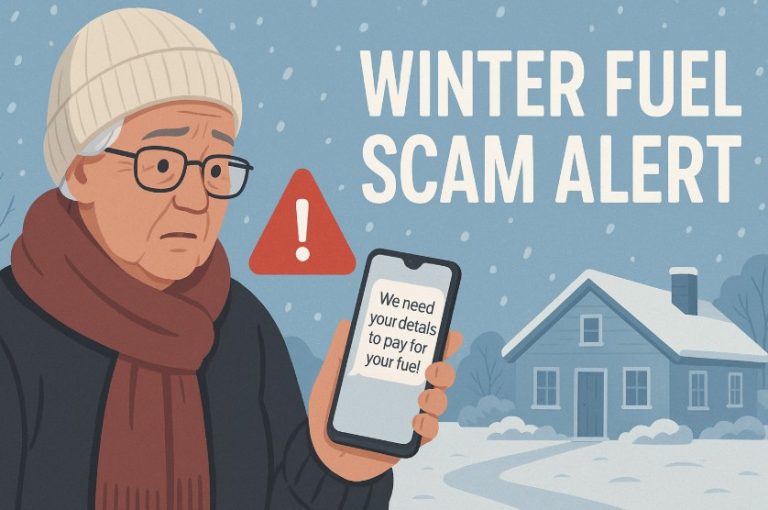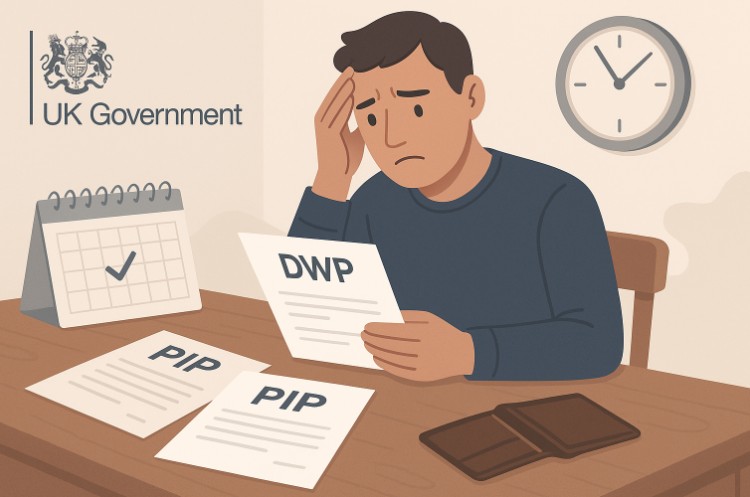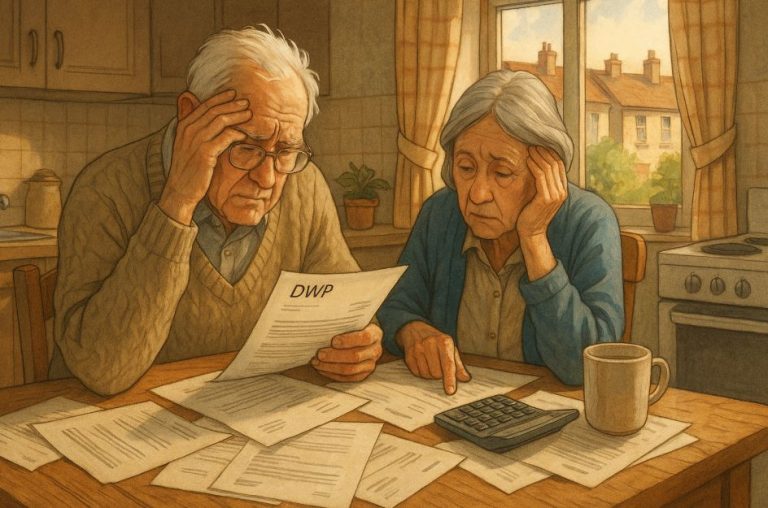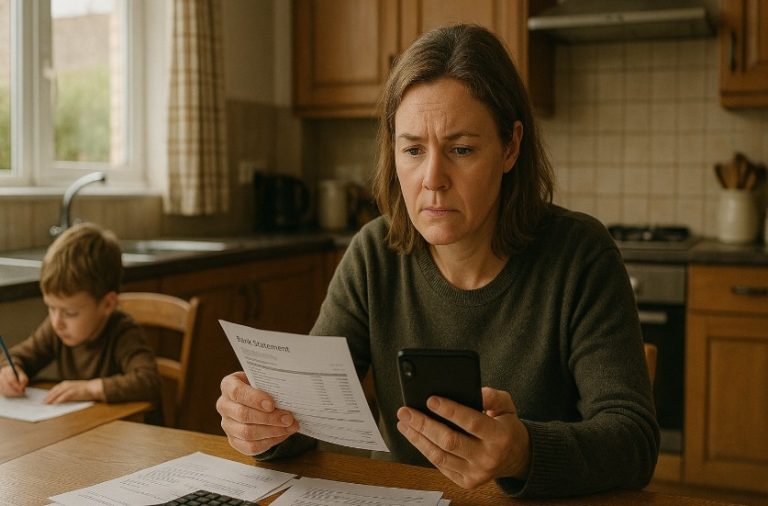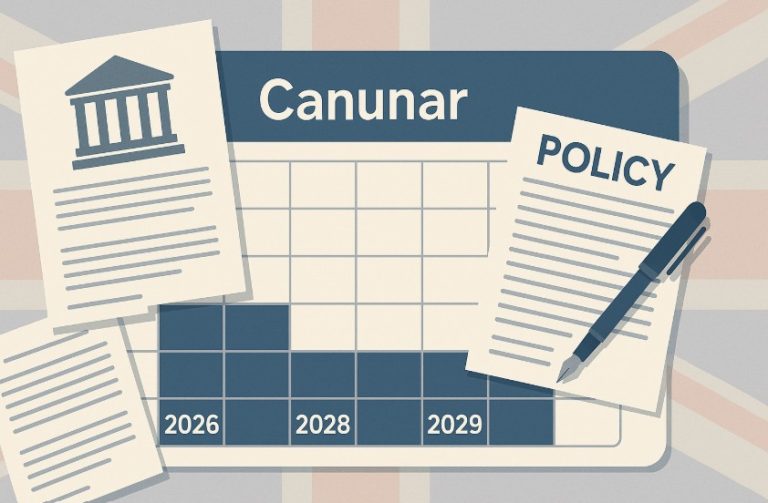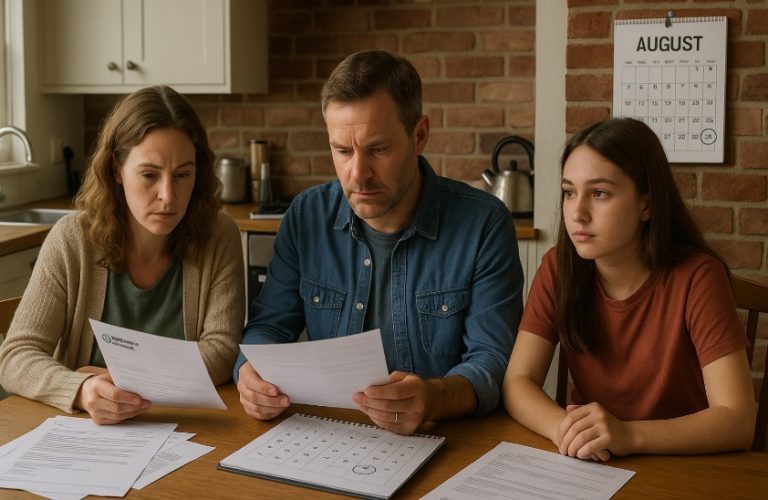Universal Credit is a lifeline for many individuals and families across the UK, offering vital financial support when it’s needed most.
However, what happens if someone is late in applying? Is it possible to have their Universal Credit backdated? Understanding the circumstances under which Universal Credit can be backdated is crucial for those who may have missed their initial application due to unforeseen issues.
This guide outlines everything you need to know, including eligibility, acceptable reasons, evidence requirements, and the process of requesting backdating.
What Is Universal Credit and Who Can Claim It?
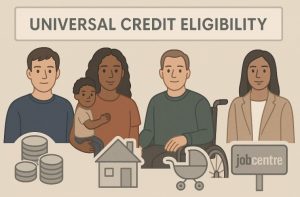
Universal Credit is a monthly benefit for people who are unemployed, on a low income, or unable to work due to health conditions or caring responsibilities. It combines six older benefits into one payment, simplifying the system for claimants.
Eligibility criteria include:
- Being over the age of 18 (exceptions apply for 16–17-year-olds in special circumstances)
- Living in the UK with a settled status
- Having savings and capital below £16,000
- Not being in full-time education unless in specific situations
- Signing and complying with a claimant commitment
Universal Credit applies to both individuals and couples and is adjusted depending on income, children, housing, and disability needs.
When Does a Universal Credit Claim Normally Start?
Understanding when a Universal Credit claim begins is essential for knowing what period your payments will cover.
Many claimants assume they will be paid from the date they became eligible, but this is not always the case.
What Determines the Start Date of a Claim?
The start date of a Universal Credit claim is the date you complete and submit your application online. This becomes the start of your assessment period, which typically lasts for one calendar month.
For example, if you submit your application on 5 March, your assessment period runs from 5 March to 4 April, and your first payment is usually made on or around 11 April.
Can the Start Date Be Earlier Than the Application Date?
Only in specific backdating situations. Otherwise, Universal Credit will not cover any period before the application was submitted. This is why it’s crucial to apply as soon as you’re eligible.
If a claimant delays their application, even by a few days, they could lose out on financial support unless they can prove a valid reason for requesting backdating.
How the Start Date Affects Monthly Payments?
Each month, the payment amount is based on your circumstances during the assessment period. These include:
- Earnings or income received
- Housing costs
- Family or childcare changes
- Health conditions affecting your ability to work
Missing the correct start date means none of these factors are taken into account for any time before you applied. This is particularly important for claimants who had rent or income losses before applying.
Under What Circumstances Can Universal Credit Be Backdated?
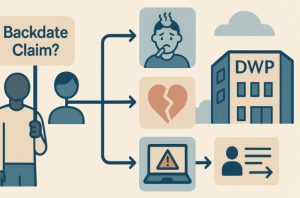
Universal Credit can be backdated if the claimant was unable to apply earlier due to specific and acceptable reasons.
The Department for Work and Pensions (DWP) assesses each request on a case-by-case basis and allows backdating for a maximum of one month.
What Counts as a Valid Reason?
To qualify for backdating, the claimant must show they had a continuous and compelling reason why the claim could not be made earlier. This reason must be supported by relevant evidence and must cover the entire period they want backdated.
Some of the most commonly accepted reasons include:
- Illness or Disability: The claimant or their partner was physically or mentally unwell, making it impossible to complete the application. Medical evidence such as GP letters or hospital notes is required.
- System Access Issues: There were problems accessing the Universal Credit online service. This may include website outages or lack of digital access due to homelessness or domestic abuse.
- Relationship Breakdown: The ending of a joint claim due to separation or domestic violence, requiring one partner to submit a new claim.
- Failure to Notify by DWP: The claimant was on another benefit such as Employment and Support Allowance (ESA) or Jobseeker’s Allowance and was not properly informed that the benefit was ending.
- Migration from Legacy Benefits: In cases of managed migration initiated by the DWP, backdating may happen automatically depending on the communication provided.
What Doesn’t Qualify for Backdating?
There are also situations where a backdating request is unlikely to be approved, such as:
- Forgetting to apply on time
- Being unaware of Universal Credit or benefit changes (unless this was due to DWP error)
- Not having immediate access to documentation, unless caused by valid hardship
In these cases, DWP generally considers that the claimant had the means and opportunity to submit the application but failed to do so without a compelling reason.
How the DWP Evaluates a Backdating Request?
The DWP will examine several factors when reviewing a request:
- Was the reason for delay valid under policy rules?
- Did the situation continue throughout the backdating period?
- Has the claimant provided suitable evidence to support the explanation?
If any of these criteria are not met, the DWP will likely reject the request. Claimants are encouraged to seek advice and gather all relevant information before submitting a request to improve the chance of approval.
How Do You Apply for a Backdated Universal Credit Claim?
Applying for backdating is a proactive process. It is not automatically considered when someone submits a Universal Credit claim late. A request must be made explicitly, either online or through direct communication with the DWP.
Available options to request backdating:
- Online journal: Use the ‘journal’ feature within the Universal Credit account to send a message requesting backdating
- Phone support: Contact the Universal Credit helpline and explain the situation
- In person: Discuss the matter with your work coach during scheduled meetings
Include key details such as:
- The reason why the claim was delayed
- The start date of the period you want to be backdated
- Any relevant supporting documents
DWP may follow up for additional clarification or documentation before making a decision.
What Evidence Is Required for a Backdating Request?
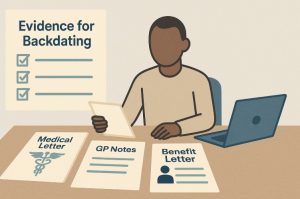
Evidence plays a critical role in backdating decisions. The DWP needs proof that the claimant was unable to apply during the proposed backdating period and that the reason was valid and ongoing.
The following table illustrates common reasons and the types of evidence accepted:
| Reason for Backdating | Types of Supporting Evidence |
| Illness or Disability | Medical certificates, GP letters, hospital discharge notes |
| System Unavailability | Screenshots, official outage notifications |
| Breakdown of Joint Claim | Legal documents, tenancy changes, official separation notes |
| Miscommunication from DWP | Letters or notices from Jobcentre or legacy benefit offices |
| Mental Health Challenges | Statements from healthcare providers, therapists or support workers |
Each document must clearly relate to the backdated period being claimed and show why it was impossible to apply earlier.
How Far Back Can Universal Credit Be Backdated in the UK?
Universal Credit can only be backdated by a maximum of one month. Even if the claimant qualifies under one or more valid reasons, the DWP will not allow backdating beyond this one-month limit.
This limitation reflects a change from older legacy benefits, which sometimes allowed longer backdating periods. Claimants must request backdating at the time of application or shortly thereafter, as late requests can be harder to justify.
The one-month period must be supported by continuous evidence. For example, if illness prevented an application for only two weeks, backdating may be approved only for that two-week duration, not the full month.
What Are the Common Reasons for Backdating Universal Credit?
DWP recognises a limited set of acceptable reasons. These reasons often involve circumstances outside of the claimant’s control and must cover the entire period for which backdating is requested.
Some examples include:
- A mental or physical health crisis that rendered the individual unable to function or complete applications
- Not receiving the proper notification about the end of a previous benefit
- Being unaware of Universal Credit requirements due to miscommunication or misinformation
- Experiencing domestic abuse or a sudden breakdown of family or housing arrangements
- Being affected by homelessness or a lack of access to digital services
The claimant must be prepared to explain how the reason affected their ability to claim and provide documents that verify the entire timeline.
Can You Appeal a Rejected Backdating Request?
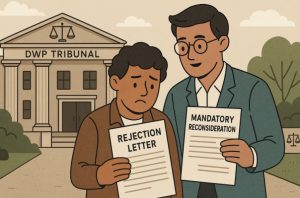
If a backdating request is denied, the claimant can challenge the decision by requesting a mandatory reconsideration. This is the first stage of appeal within the Universal Credit system.
To initiate a reconsideration:
- Submit a written or online request within one month of the original decision
- Clearly state the disagreement and why the decision should be changed
- Provide any additional documents that may support the case
If the mandatory reconsideration does not lead to a change in the decision, the next step is to appeal to a First-tier Tribunal, which operates independently of the DWP.
It is advisable to seek help from welfare rights advisers or organisations such as Citizens Advice during this process.
What Should You Do If Your Universal Credit Is Delayed?
Delays in receiving Universal Credit can cause serious financial hardship. In some cases, delays occur because verification steps are incomplete or supporting documents are missing. In others, system errors or heavy caseloads can slow down processing times.
To respond to delays:
- Log into your online account and check for outstanding actions or tasks
- Use your journal to message your work coach for clarification
- Call the Universal Credit helpline to escalate the issue if needed
Claimants experiencing financial distress due to delays can apply for a Universal Credit advance payment. This is a loan that must be repaid over time from future payments.
How Does Backdating Affect Payment Dates and Amounts?
If backdating is approved, it results in an additional one-time payment that covers the missed period. The regular payment schedule resumes immediately after.
The following table explains how payments are affected:
| Scenario | Payment Impact |
| Backdating approved for 2 weeks | Lump sum added to next Universal Credit payment |
| Full one-month backdating approved | Larger initial payment issued after approval |
| No backdating approved | Payments begin from original claim date only |
| Delay with housing or childcare costs | Adjustments applied after assessment period is recalculated |
Backdated amounts are calculated according to the rates in effect during the claimed period. This includes standard allowance as well as additional elements like housing or disability.
Are There Alternatives If Backdating Is Not Approved?
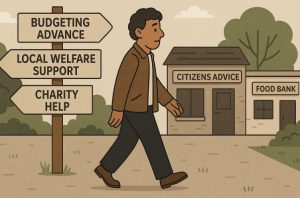
Claimants who are unsuccessful in backdating and are experiencing hardship may still be eligible for other types of support.
These include:
- Local welfare assistance from local authorities to cover emergencies such as food or heating
- Budgeting advances from the DWP to cover one-off essential expenses
- Discretionary Housing Payments (DHPs) from the council for help with rent
- Food banks and charitable grants from organisations such as Turn2us or The Trussell Trust
In many cases, Universal Credit claimants are also eligible for additional benefits, including:
- Free prescriptions and dental treatment
- Council Tax Reduction
- Healthy Start vouchers for families with young children
Seeking guidance from welfare advisers or community support services can help maximise available assistance.
Conclusion
Understanding when and how Universal Credit can be backdated is essential for those who miss the standard application window.
While backdating is possible, it’s only granted under specific, justified circumstances and with appropriate evidence. Claimants must be proactive in submitting requests and clear in explaining their situation.
Seeking support from welfare advisers or organisations like Citizens Advice can help strengthen a case. Ensuring timely applications and staying informed can significantly improve access to the financial support Universal Credit offers.
Frequently Asked Questions About Backdating Universal Credit
What happens if you apply for Universal Credit late?
If you apply late, you may miss out on payments for the period before the application. Backdating is only possible if you have a valid reason and evidence.
How do I challenge a backdating refusal?
Start with a mandatory reconsideration. If still denied, you can appeal to a benefits tribunal for a further review.
Is mental health a valid reason for backdating?
Yes, if your mental health condition prevented you from applying on time and you have medical evidence to support it.
Can Universal Credit be backdated more than once?
Each claim can be backdated once, for up to one month. If you have a change of circumstances later, that may affect your payments but is not the same as backdating.
Does backdating affect future Universal Credit payments?
No, it only affects payments for the period you’ve requested. Future payments continue as scheduled.
Is it easier to backdate if I was on another benefit?
Possibly. If you were on a legacy benefit and not properly informed about Universal Credit, that may support your backdating request.
Who can help with my backdating application?
Citizens Advice, welfare rights advisors, and DWP work coaches can provide guidance and assistance with claims and appeals.

